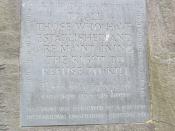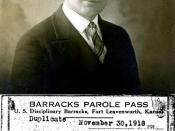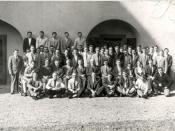One of the most eminent of Trocme's moral stances was on non-violence. Shaped by a violent past and deep faith; Trocme's message of passivity required respect for humanity, trust in God, and an unending desire to forgive. Trocme's primary influence in making this stance was a chance encounter with a German soldier who was a conscientious objector in the First World War (Hallie, 58). Also crucial in his position was his deep faith in God. The German soldier appealed to a young Trocme's faith and his fears of a nonviolent position when he said that "men cannot hurt those who have put all their confidence in God" (59). Trocme was obviously affected by this meeting and when he was sent as a young soldier to Morocco he carried no weapon or ammunition (2). Although his stance was clear, the manner by which he executed his stance had yet to develop fully.
Trocme's lieutenant explained to him how his lack of arms put the others in his company in danger. Trocme then realized that "non violence could, in fact, increase violence if it was not chosen in the right way at the right time" (93).
Trocme's passive position thought The Second World War required a myriad of extraordinary talents that enabled he and the other Chambonnais to remain devoted to the preservation of all life despite great adversity. Key to this lifestyle was forgiveness. Trocme demonstrated his capacity for forgiveness at a very early age. Even immediately following his beloved mother's death he forgave his father who brought about her demise. "Andre Trocme firmly believed that his father was morally responsible for her death: in effect, he had killed her, as far as the son was concerned. But the son still loved the father and hugged him and forgave...


